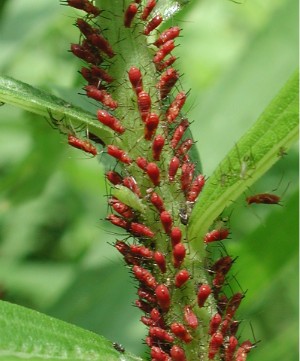A study by the University of Haifa shows that plant-eating insects recognize a mammal that is coming to eat the plant they are on by using their mouth, and thanks to this they abandon the plant and thus escape accidental predation by them * Possible application - biological control

Mouthwash can save lives - of insects at least, according to a new study conducted at the University of Haifa. The study, published in the prestigious journal Current Biology, shows that aphids recognize the mouth of mammals that come to eat the plant they are on and respond by immediately falling to the ground saving them from certain death.
Plant-eating insects are often in danger of "accidental predation": a situation in which they are accidentally eaten when some mammal eats the plant they are on. The study, the first of its kind, conducted in the laboratory of Prof. Moshe Inbar from the University of Haifa by PhD student Moshe Gish in collaboration with Prof. Amots Dafni, sought to test whether insects have a specific mechanism to protect against such accidental predation.
The study examined the behavior of the pea aphid, a tiny vegetarian insect that lives in colonies, sucks the plant's fluids and is considered a significant pest to agricultural crops. The researchers tested a number of markers by which the aphids can reliably and in real time identify the danger inherent in a mammal (such as a goat, sheep, etc.) approaching the plant: a shaking branch, a sudden shadow and the mammal's exhalation. It was found that only the exposure to the mammal's oral cavity will cause an immediate and mass abandonment (through falling) of the aphid colony. Later, using a controlled system that simulates exhalation, the researchers checked what the specific factors in the oral cavity are that the aphid uses to identify the danger. It turned out that volatile substances in the exhalation are not detected by the aphids and only the combination of a sudden air current with the temperature and humidity characteristic of the mouth of mammals causes mass abandonment of the plant.
"An aphid falling to the ground is no small matter. A fallen aphid loses its sole food source, and is forced to walk to find a new plant, risking dehydration, starvation, and predation by ground predators. To avoid wrong identification and consequently falling unnecessarily, it is important for aphids to reliably sense the approach of a mammal to the plant. It turns out that despite their tiny size, vegetarian insects have developed sophisticated and efficient survival mechanisms that allow them to survive encounters with animals that are dozens of them large," the researchers noted.
They added that apparently other insects also use similar defense mechanisms that indicate complex interrelationships between mammals and plant-eating insects and that the findings of the current study may be a first step in the development of alternative pest control measures for harmful insects.

One response
There are also parasites whose goal is to be devoured by a mammal because inside it they multiply or through it they spread to other places.